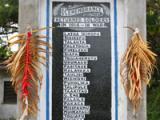First included within the boundaries of New Zealand in 1901, the islands were governed by a Resident Commissioner until 1946. When they achieved self-government, Cook Islanders remained New Zealand citizens.
Cook Islands
Events In History
Articles
Read the Treaty

Transcript of the English version of the original Treaty of Waitangi document. Read the full article
Page 4 - Treaty of Waitangi translations
The Treaty of Waitangi translated into Cook Islands, Samoan, Tongan, Niuean and Tokelau
The 1960s
Five decades ago most Kiwis enjoyed a standard of living that was the envy of other nations. During the 1960s the arrival of TV and jet airliners shrank our world, and New Zealanders began to express themselves on a range of international issues, including opposition to the Vietnam War. Read the full article
Page 8 - 1965 - key events
A selection of the key events in New Zealand history from
Pacific Islanders in the NZEF

Cook Islanders, Niueans, Fijians and Gilbert Islanders all took their place in the ranks of the New Zealand Expeditionary Force during the First World War. As well as the dangers of war, Pacific soldiers faced language difficulties, an unfamiliar army diet and European diseases. Read the full article
Page 1 - Pacific Islanders in NZEF
Cook Islanders, Niueans, Fijians and Gilbert Islanders all took their place in the ranks of the New Zealand Expeditionary Force during the First World War. As well as the dangers
Page 2 - Niueans and Cook Islanders
Information about Niuean and Cook Island soldiers who were part of the 3rd Maori Contingent in
Page 3 - The Rarotongan Company
Information on the New Zealand Rarotongan Company, which served in the Sinai and Palestine campaigns
Page 5 - Difficulties faced by Pacific Islanders
Information on the difficulties faced by Pacific Islanders when they left their island homes for the first time and entered the
Page 6 - Roll of Honour
List of soldiers from the Cook Islanders and Niue who were killed in the First World
Pacific aftermath
Participation in the First World War changed Pacific Islanders' lives. Returning servicemen had seen the world. Read the full article
Page 2 - Peace celebrations in the Pacific
News of the Armistice in Europe in November 1918 came swiftly to Rarotonga via its new wireless
Page 4 - NZ government acknowledgement
During the 1920s, the contribution of the Cook Islands and Niue to the war effort was recognised in a number of ways, especially official visits, the building of monuments and the
Page 5 - Economic, social and political impact
The First World War opened the Pacific Islands to the world more than they ever had been
Anzac Day in the Pacific

Armistice Day was the initial focal point for commemorations in the Cook Islands and Niue after the First World War. But because men from both countries had served in the New Zealand Expeditionary Force, observances gradually shifted to Anzac Day in April Read the full article
Page 1 - Anzac Day in the Pacific
Armistice Day was the initial focal point for commemorations in the Cook Islands and Niue after the First World War. But because men from both countries had served in the New
Page 2 - Early commemorative efforts
During the 1920s war memorials provided a focus for commemoration services in the Cook Islands, where the first Anzac Day service was possibly held in 1927. On Niue, Armistice
Page 3 - The growth of Anzac Day
By the end of the Second World War military commemorations in the Cook Islands and Niue centered around Anzac Day. Services in both countries followed the pattern of those in New
Page 4 - Present day commemorations
In the new millennium there has been increasing interest in the story of Pacific Island involvement in the First World War. In the Cook Islands there have been efforts to rebuild
Page 5 - Further information
Books and further reading relating to the history of Anzac Day in the Pacific Islands of Niue and the Cook





















